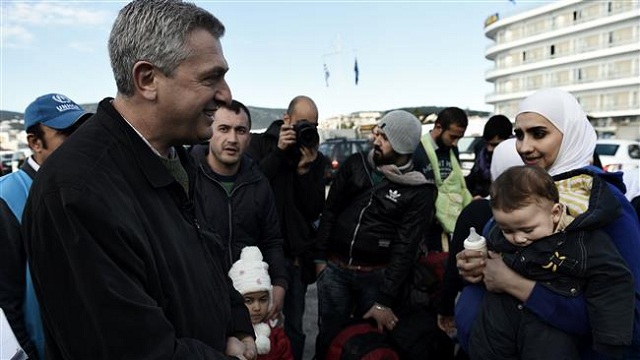Greece running out of space to shelter migrants


Filippo Grandi, the UNHCR chief, (L) speaks with Syrian refugees during his visit at the port of Mytilene, Greece, February 23, 2016. (AFP photo)
Idomeni — Greek police removed hundreds of protesting migrants blocking a railroad border crossing, as concern grows that people pouring in from Turkey and running into a closed border may overwhelm the country’s sheltering capacity.
Around 900 people had been blocking the track since Monday in protest at Macedonia’s policy of allowing only Syrian and Iraqi refugees to cross its borders while stopping all others.
Police transported the mostly Afghan protesters inland, away from the border.
But Greece may quickly run out of shelters if Macedonia continues stopping Afghans from entering, an international aid organisation warned on Tuesday.
“If Macedonia does not re-open it border to Afghans soon, Greece’s sheltering capacity will be full within eight days,” a Doctors Without Borders spokesperson, Gemma Gillie, told dpa at Idomeni.
The Greek Defence Ministry meanwhile held an emergency meeting to discuss opening old army barracks to stranded migrants, a source from the government told dpa in Athens.
Thousands of migrants have amassed in the Greek village of Idomeni on the border with Macedonia since Skopje on Sunday stopped allowing Afghans to pass into the country along with Syrian and Iraqi refugees.
The Afghans had previously been allowed passage along the Balkan migration route from Greece, through Macedonia, Serbia, Croatia and Slovenia to Austria.
Balkan countries in November began turning back all others — mostly from Pakistan, Bangladesh and Africa — regarding them as economic migrants without a chance of receiving asylum in EU countries.
After Austria capped the number of asylum seekers it would take to 80 daily, allowing a further 3 200 to pass on to Germany, other Balkan route countries also took steps to limit the influx of migrants.
The Slovenian Parliament late on Monday – in a rare display of bipartisan unity — authorised with an overwhelming majority the army to police the border with Croatia.
The measure is intended to suppress trespassing and people-smuggling, which has been on the rise in the Balkans since the transit countries began pushing the door shut in recent months.
Filtering war-zone refugees from thousands of economic migrants places Greece under huge pressure.
Unable to stop people from arriving at its Aegean islands from the nearby Turkish coast, Greece worries that it will end up sheltering tens of thousands of stranded migrants.
Only on Tuesday morning, another 1 250 migrants disembarked in Athens from ferries that brought them from the islands, the Greek Coast Guard said.
The authorities are trying to channel the migrants to a collecting centre in a sports arena near the port of Piraeus, but most attempt to continue the journey north on their own, reports say.
Nearly 1 million people traversed the Balkan migration route in 2015, intending to seek asylum in Germany and other wealthy countries.
The bulk arrived in the latter half of that year and the surge continues in 2016.
According to International Organisation for Migration figures released Tuesday, more than 100 000 refugees and migrants have already crossed the Mediterranean — nearly all via the Aegean from Turkey to Greece — since the start of 2016. — News24.











Comments